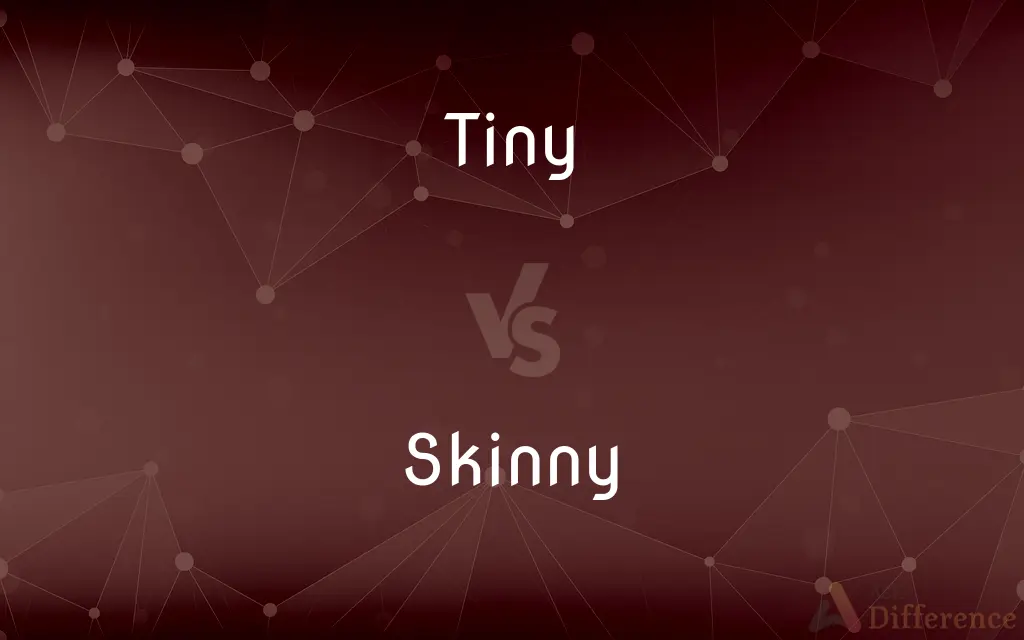Tiny vs. Skinny — What's the Difference?
By Fiza Rafique & Urooj Arif — Updated on April 25, 2024
Tiny refers to very small size or quantity, emphasizing diminutiveness; skinny highlights an unusually thin appearance, often related to lack of body fat.

Difference Between Tiny and Skinny
Table of Contents
ADVERTISEMENT
Key Differences
Tiny often describes something extremely small in size or amount, suggesting a degree of cuteness or minuteness in physical dimensions. On the other hand, skinny is typically used to describe a person or animal that is very thin, sometimes to the point of being underweight, focusing primarily on body shape and composition.
While tiny can be used affectionately or endearingly to describe objects, pets, or features that are notably small, skinny often carries a neutral or negative connotation, particularly when referring to health or aesthetic standards. This difference in emotional tone can affect how each term is perceived and used in social contexts.
Tiny is applicable in a variety of contexts, from describing a tiny screw in a piece of machinery to a tiny amount of liquid. Whereas skinny is almost exclusively used to describe the body type of living beings, or metaphorically to describe slender non-living objects like a skinny tree.
In terms of scale, tiny encompasses more than physical presence; it can also refer to quantities or degrees, like a tiny bit of sugar. On the other hand, skinny is strictly used for describing dimensions that are narrower than usual, often without reference to quantities.
Comparison Chart
Usage
Describes small size or quantity
Describes thinness of living beings
ADVERTISEMENT
Connotation
Often positive or neutral
Can be neutral or negative
Applicability
Broad (objects, amounts, etc.)
Narrow (primarily bodies)
Emotional Tone
Can be endearing
Often lacks affection
Metaphorical Use
Limited
Common in describing objects
Compare with Definitions
Tiny
Minuscule in amount.
She added a tiny pinch of salt to the recipe.
Skinny
Minimalist in detail or robustness.
She gave a skinny summary of the meeting.
Tiny
Limited in scope.
They started with a tiny budget for their project.
Skinny
Lacking in width or breadth.
A skinny path led to the house.
Tiny
Insignificant in scale.
He felt a tiny bit of regret.
Skinny
Slender and elongated.
He bought some skinny jeans that fit him perfectly.
Tiny
Extremely small in size.
The tiny ant crawled across the sidewalk.
Skinny
Low in fat content.
He opted for the skinny latte to reduce his calorie intake.
Tiny
Diminutive, making something look cute.
She wore a tiny hat that suited her doll.
Skinny
Very thin, especially in a way that suggests undernourishment.
The skinny stray cat looked like it needed more food.
Tiny
Very small
A tiny hummingbird
Skinny
Having very little bodily flesh or fat, often unattractively so; very thin.
Tiny
A very young child
Books that will make tinies and parents laugh out loud
Skinny
(informal) thin, generally in a negative sense (as opposed to slim, which is thin in a positive sense).
Her recent weight loss has made her look rather skinny than slender
Tiny
Extremely small
The glass shattered into tiny shards that were hard to clean up.
Skinny
Having reduced fat or calories.
Tiny
Very small.
Skinny
Naked; nude (chiefly used in the phrase skinny dipping).
Tiny
A small child; an infant.
Skinny
(of clothing) tight-fitting
Skinny jeans
Tiny
Anything very small.
Skinny
(golf) thin
Tiny
Very small; little; puny.
When that I was and a little tiny boy.
Skinny
(colloquial) The details or facts; especially, those obtained by gossip or rumor.
She called to get the skinny on the latest goings-on in the club.
Tiny
Very small;
Diminutive in stature
A lilliputian chest of drawers
Her petite figure
Tiny feet
The flyspeck nation of Bahrain moved toward democracy
Skinny
A state of nakedness; nudity.
Skinny
(informal) A low-fat serving of coffee.
Skinny
(nonstandard) A skinny being.
Skinny
(transitive) To reduce or cut down.
Skinny
Consisting, or chiefly consisting, of skin; wanting flesh.
He holds him with a skinny hand.
Skinny
Confidential information about a topic or person;
He wanted the inside skinny on the new partner
Skinny
Having unattractive thinness;
A child with skinny freckled legs
A long scrawny neck
Common Curiosities
Can "tiny" be used to describe sounds?
Yes, "tiny" can describe sounds, indicating that they are very faint or slight, such as a tiny whisper.
How does "skinny" relate to clothing styles?
"Skinny" is often used to describe certain styles of clothing that are tight-fitting, such as skinny jeans or skinny ties.
Does "skinny" always refer to a lack of fat?
Primarily, yes, "skinny" is used to describe a lack of fat and often muscle, resulting in a very thin appearance.
Are there idioms that use the word "tiny"?
Yes, one common idiom is "the tiny details," which emphasizes the importance of small, often overlooked aspects.
How do fashion industries impact the use of "skinny"?
The fashion industry has popularized "skinny" as a desirable attribute, especially with trends like skinny jeans, affecting how the term is viewed culturally.
Can "skinny" be used in a humorous context?
Yes, "skinny" can be used humorously, especially in exaggerative statements like describing a thin smartphone as "skinny."
Can "tiny" and "skinny" be used interchangeably?
No, "tiny" and "skinny" are not interchangeable as "tiny" refers to small size or amount and "skinny" refers to thinness.
What is a synonym for "tiny" that emphasizes cuteness?
"Teeny" or "minuscule" can be used as synonyms for "tiny" when emphasizing cuteness or appeal.
Is "skinny" used differently in different regions?
Yes, in some regions "skinny" is commonly used to describe something positive like fashion trends, while in others it might have a more negative association related to health.
What are the negative implications of using "skinny"?
Using "skinny" can imply undernourishment or unhealthy thinness, which can be negative, especially in contexts concerned with physical health.
What is an example of "tiny" used in a metaphorical sense?
"A tiny ray of hope" is a metaphorical use of "tiny" to describe a small but significant sense of optimism.
How do children's perceptions of "tiny" and "skinny" differ?
Children might view "tiny" as cute or adorable, whereas "skinny" might not evoke a specific emotional response unless associated with characters or contexts they are familiar with.
How can "tiny" enhance descriptive writing?
"Tiny" can add precision and evoke imagery in descriptive writing, helping to scale scenes or objects effectively.
Is "tiny" used in technical contexts?
Yes, "tiny" is used in technical contexts to describe small components or quantities, such as in engineering or computing.
Can "tiny" imply a quality of endearment?
Yes, "tiny" often implies endearment, especially when describing babies, small animals, or miniature versions of items.
Share Your Discovery

Previous Comparison
Outlet vs. Receptacle
Next Comparison
Lasagne vs. LasagnaAuthor Spotlight
Written by
Fiza RafiqueFiza Rafique is a skilled content writer at AskDifference.com, where she meticulously refines and enhances written pieces. Drawing from her vast editorial expertise, Fiza ensures clarity, accuracy, and precision in every article. Passionate about language, she continually seeks to elevate the quality of content for readers worldwide.
Co-written by
Urooj ArifUrooj is a skilled content writer at Ask Difference, known for her exceptional ability to simplify complex topics into engaging and informative content. With a passion for research and a flair for clear, concise writing, she consistently delivers articles that resonate with our diverse audience.














































